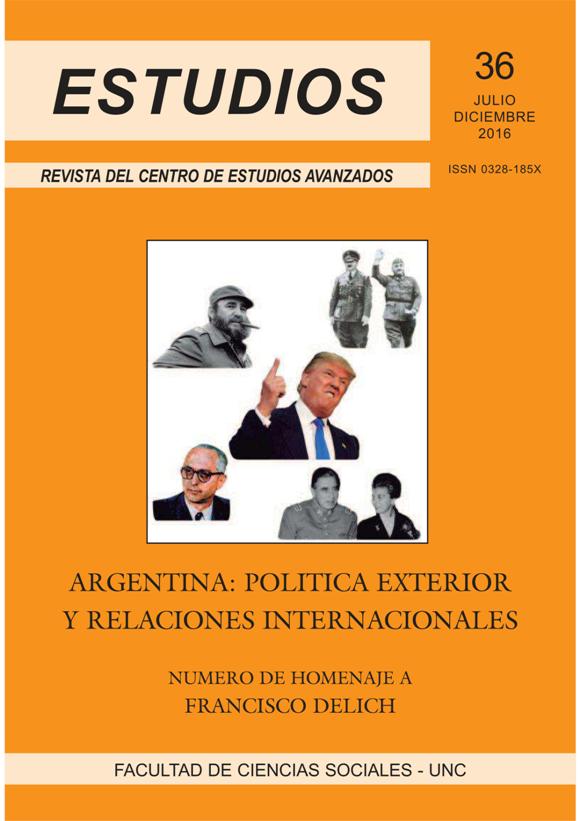Malvinas. Argentine Foreign Policy (1989-2015)
DOI:
https://doi.org/10.31050/re.v0i36.17164Keywords:
Malvinas, pendulum, sovereignty, strategiesAbstract
The objective of this paper is to investigate Argentina's foreign policy towards the Malvinas Islands during the period from the presidency of Carlos Menem to the mandates of Néstor Kirchner and Cristina Fernández de Kirchner. The history of Argentine international relations can be understood as a pendulum, at one extreme we find the strong rapprochement to certain hegemonic countries while, on the other, we observe an approximation towards the countries of Latin America. In the analysis of the mentioned period we will pose the following questions: How is each side of the pendulum characterized and what were the reasons for this positioning in the indicated period? What were the strategies that were proposed based on one positioning or another with respect to the Malvinas question? And finally, we will investigate the dynamics of these strategies in relation to costs and benefits for Argentina. The hypothesis presented here is that Argentina's strategy of claims and confrontation over the sovereignty conflict between 2003 and 2015 achieved a better position at the global level in its support than that designed in the 1990s with a proposal for negotiation and intervention by the United States.The objective of this work is to investigate Argentine foreign policy with respect to the Malvinas Islands, during the period between the presidency of Carlos Menem and the mandates of Nestor Kirchner and Cristina Fernandez de Kirchner. The history of Argentine international relations can be understood as a pendulum, at one extreme we observe a strong approach to certain hegemonic countries while on the other, we see an approach to the countries of Latin America. In the analysis we will try to answer the following questions: how each side of the pendulum is characterized and what were the reasons for that position in the mentioned period? What were the strategies that were raised on the basis of a position or the other with respect to the Malvinas question? And finally, we inquire about the dynamics of these strategies in relation to the costs and benefits for Argentina. The hypothesis presented here is that the strategy in seeking regional support from Argentina on the sovereignty dispute, achieved a better position worldwide in their claims. Otherwise, during the 1990s, with the approach of "carnal relations" has not achieved more than some enhancements without substantial results in the central pose, the discussion on sovereignty of the islands.References
BOLOGNA, Alfredo, (1995), “Malvinas en la Agenda de Política Exterior Argentina Revista”,Revista de Relaciones InternacionalesNº 9. UNLP.
BOLOGNA, Alfredo, (2006),“La cuestión Malvinas una mirada desde lo económico”, en: La política exterior del gobierno de Kirchner. Rosario: CERIR.
BOLOGNA, Alfredo (Dir.), (2010), La Política Exterior del gobierno de Cristina Fernández: apreciaciones promediando su mandato de Kirchner. Rosario: UNR.
CORIGLIANO, Francisco, (2000),“‘Las "relaciones carnales’: Los vínculos con las grandes potencias, 1989-2000” en ESCUDÉ, Carlos y CISNEROS, Andrés, Historia General de las Relaciones Exteriores de la República Argentina (Tomo XV).
ESCUDÉ, Carlos. (1986), La Argentina vs las Grandes Potencias. Buenos Aires: Belgrano.
ESCUDÉ, Carlos, (1992),Realismo periférico: Bases teóricas para una nueva política exterior argentina.Buenos Aires: Planeta.
ESCUDÉ, Carlos, (2012), Principios de Realismo Periférico. Buenos Aires:
GIL, Sebastián, (1999), Las islas Malvinas y la Política Exterior Argentina durante los 90s, Consejo Argentino para las Relaciones Internacionales. Buenos Aires: CARI.
JAGUARIBE, Helio, (1979), “Autonomía Periférica y Hegemonía céntrica” ponencia presentada en el seminario “América Latina y el Nuevo Orden Económico Internacional”, en:Estudios Internacionales del Instituto de Estudios InternacionalesVol 12, Nº 46, Universidad de Chile. Disponible en: http://www.revistaei.uchile.cl/index.php/REI/article/view/16458
MELO, Artemio Luis, (2000), La cuestión Malvinas: situación actual, en Ponencias, Años V – VI, Nº 8-11, Instituto Estanislao Zeballos de Estudios Internacionales. CONICET, Cerider. pp. 43-72.
PUIG, Juan Carlos, (1983), Malvinas y el Régimen Internacional. Buenos Aires: Depalma.
SIMONOFF, Alejandro, (2003), “La interpretación del pasado como eje de disputa de la política exterior actual: de Puig a Escudé”, en:Relaciones Internacionales N° 25.
Downloads
Additional Files
Published
Issue
Section
License
Aquellos autores/as que publiquen en esta revista, aceptan los términos siguientes:- Los autores/as conservarán sus derechos de autor y garantizarán a la revista el derecho de primera publicación de su obra, el cual estará simultáneamente sujeto a la Licencia Creative Commons Atribución-NoComercial 4.0 Internacional que permite a terceros compartir la obra siempre que se indique su autor y su primera publicación esta revista.
- Los autores/as podrán adoptar otros acuerdos de licencia no exclusiva de distribución de la versión de la obra publicada (p. ej.: depositarla en un archivo telemático institucional o publicarla en un volumen monográfico) siempre que se indique la publicación inicial en esta revista.
- Se permite y recomienda a los autores/as difundir su obra a través de Internet (p. ej.: en archivos telemáticos institucionales o en su página web) luego del proceso de envío, lo cual puede producir intercambios interesantes y aumentar las citas de la obra publicada. (Véase El efecto del acceso abierto).












